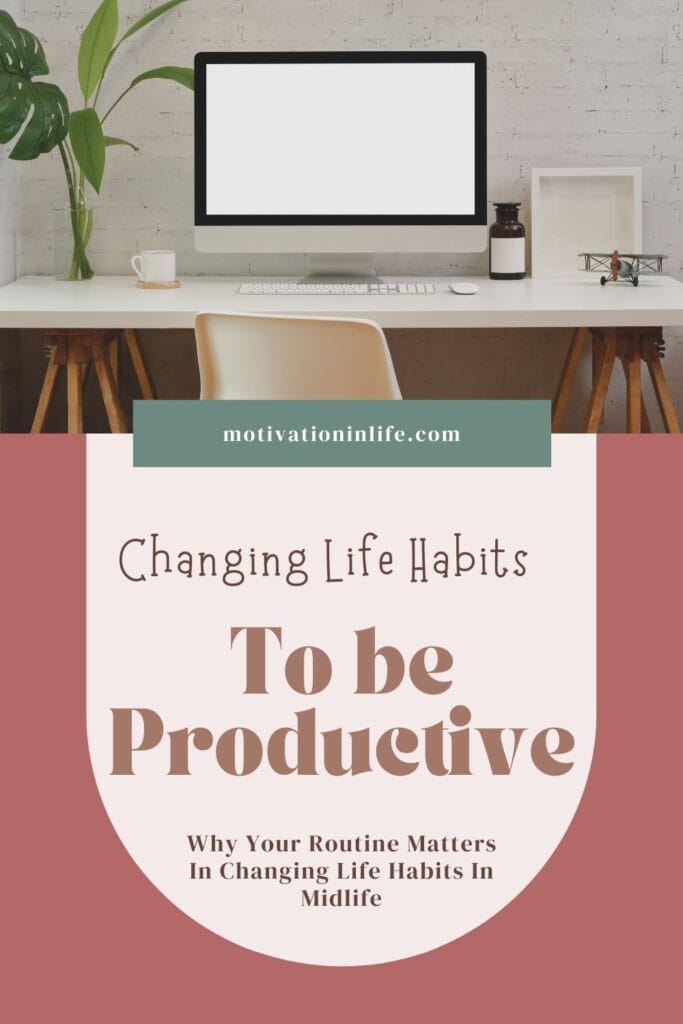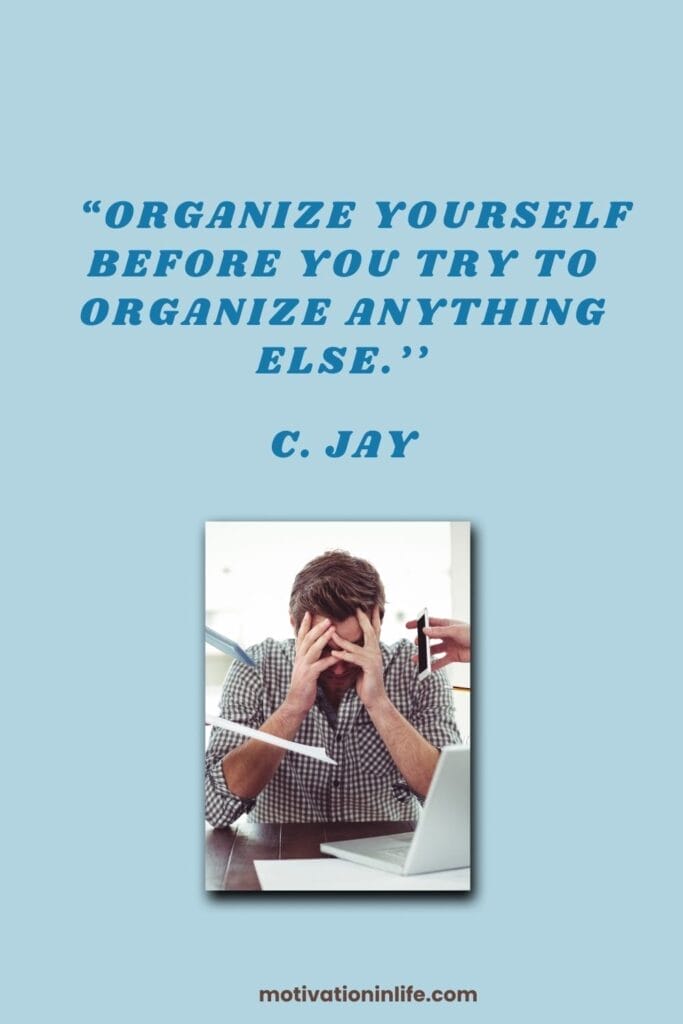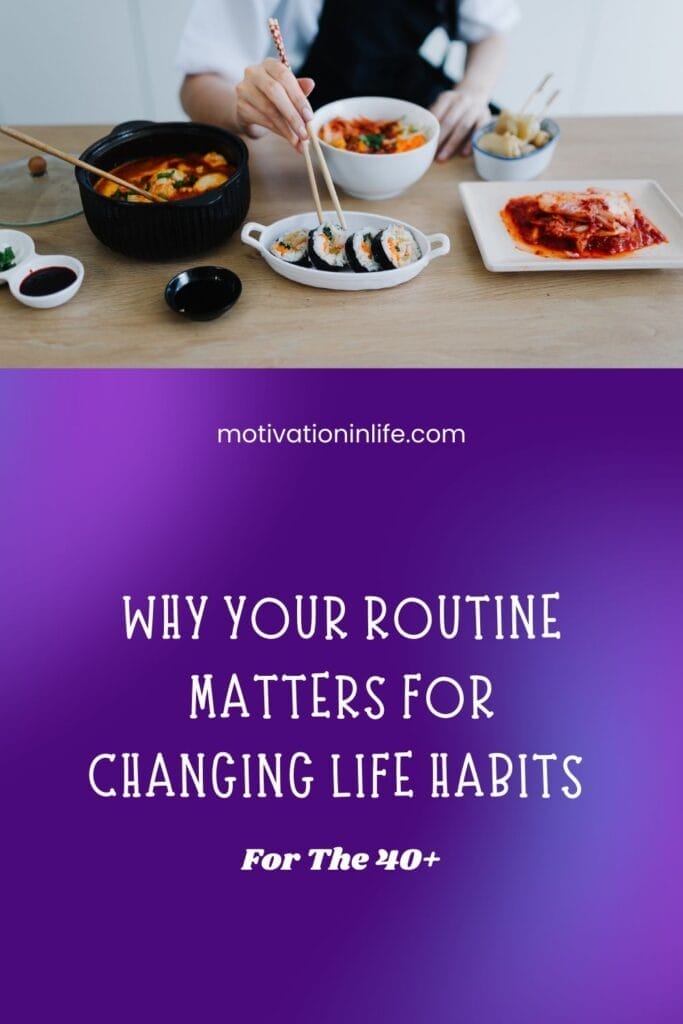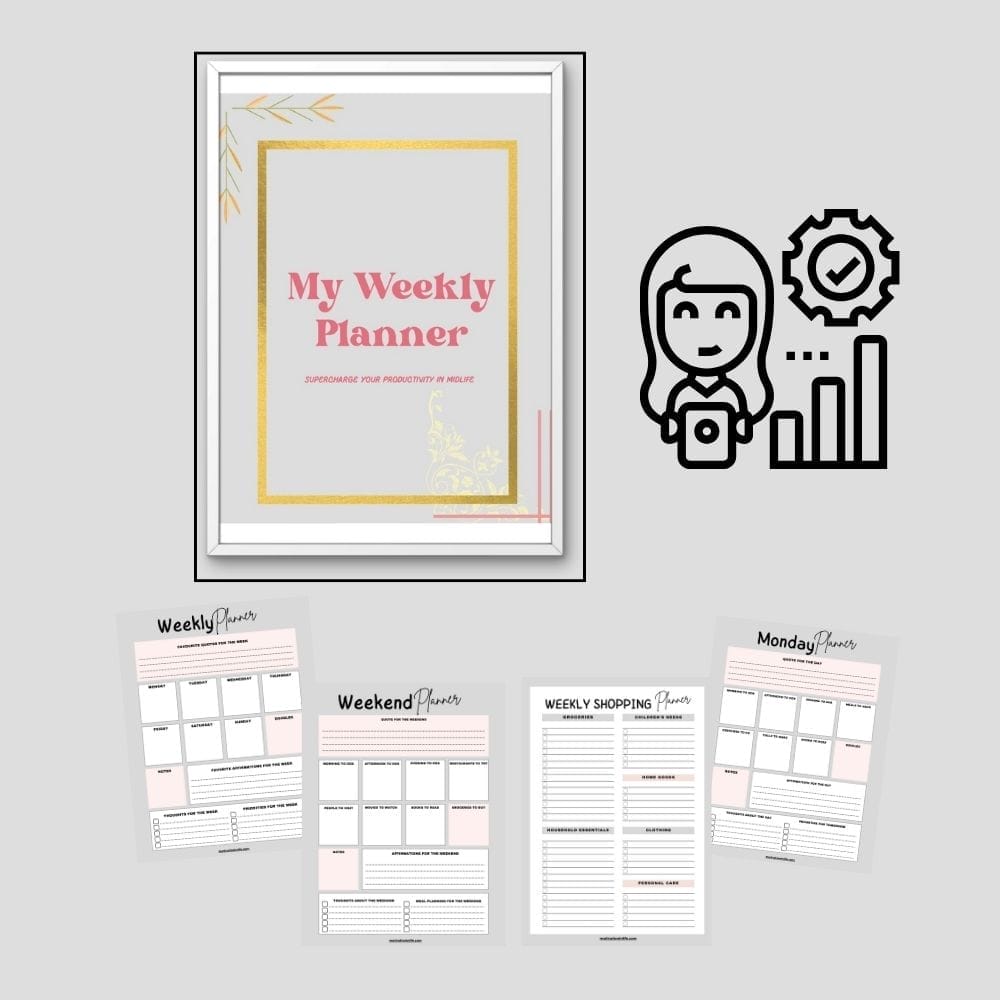Why Your Routine Matters For Changing Life Habits (For The 40+)
“All our dreams can come true, if we have the courage to pursue them.”
Walt Disney
When in your 40s and beyond, you should aim at changing life habits that do not serve you and help you adopt healthier habits. You may feel that developing healthy habits and making them a permanent part of your routine can be challenging.
Here, you need to understand that the key lies not necessarily in the nature of the habits themselves but in the structure of your daily routine. To ensure that new habits become your way of life, you must integrate them seamlessly into your existing schedule.
This involves selecting a daily routine that naturally accommodates these habits without requiring excessive effort or thought. The significance of your routine becomes evident when you wish to improve your daily habits as you age.
Table Of Contents
AFFILIATE DISCLOSURE
This post may contain affiliate links. We may earn a small affiliate commission at no extra cost if you click on them.
motivationinlife.com is also a participant in the Amazon Services LLC Associates Program, an affiliate advertising program designed to provide a means for sites to earn advertising fees by advertising and linking to Amazon.com and Amazon.in
We may earn a small commission for our endorsement, recommendation, testimonial, and/or link to any products or services from this website.
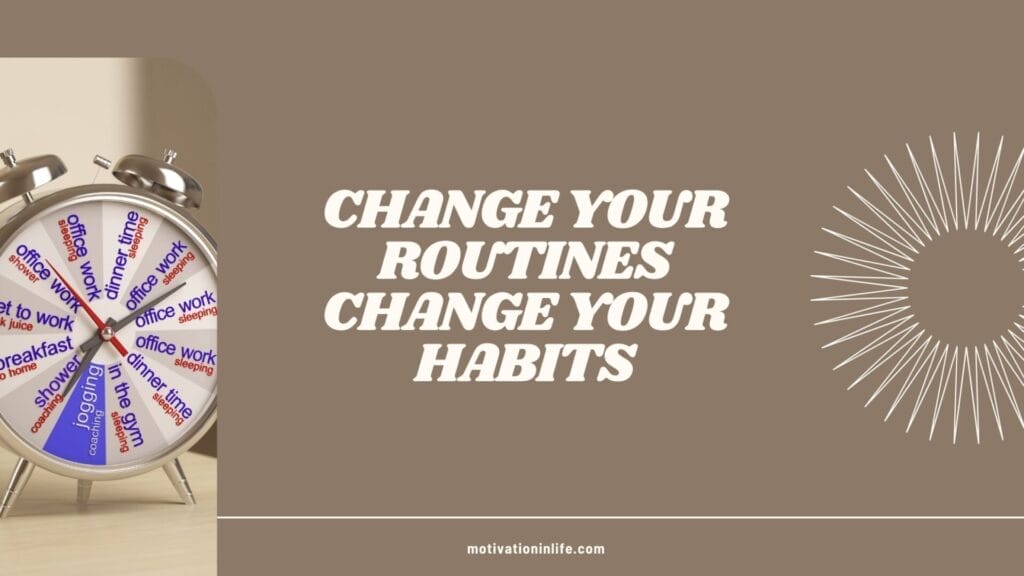
Changing Life Habits Is Not Possible Without A Routine In Midlife
When you were younger, you were probably never told what makes a habit a habit. It is also true that once you hit your 40s and beyond, the ability to change your habits reduces.
For habits to gain permanence, you need structure and routine. Repeat something so often that it soon becomes a “habit”, or an activity you barely even have to think about.
It is similar to driving home from work, using the same route you have used every day for years, and realizing you have been driving on autopilot without realizing it. This same concept can be used when you are trying to add new habits into your life and delete old ones
If you are working on your nighttime routine and you want to sleep better by not using your phone right before bed, then you need a nighttime routine that reminds you to turn your phone off well before sleep.
This might include a few habits you already have in your nighttime routine that can trigger this new habit.
You can adjust your daily routines to allow for a logical place for your habits. The more you merge these habits into those routines, the easier they are to keep up with. Reading a chapter at night is much easier to do when it is part of your routine around that time.
Planning your days well will help you follow your routine. Download the Weekly Planner we have designed for you using the templates at Creative Fabrica to start taking action today!!
Your Routine Helps Provide Cues For Your Habits
Cues and habit triggers are so impactful when it comes to changing your habits into healthier ones. Going back to the example of wanting to read at night instead of using your phone before bed, look at your current nighttime routine and find something that “cues” you into that new habit.
When you are heading to bed, you may have had the habit of bringing your phone into bed with you. It was an automatic reaction because you had done it so many times before.
What could provide a cue that you need to place your phone away from the bed and plug it in without wanting to look at it while lying down?
Maybe when you get your pajamas from your dresser at night, you have a charging station on top of your dresser where you place your phone at night to charge.
Just seeing the charging station or USB cord as you get your pajamas can cue and trigger that habit of leaving your phone there, instead of bringing it into bed with you. Start small and remind yourself to do it every day soon; the habit will become a part of your routine.
If you are clueless about the good habits to have, please read our blog post, 17 Habits To Change Your Life For Colossal Positive Attitude (For The 40 +)
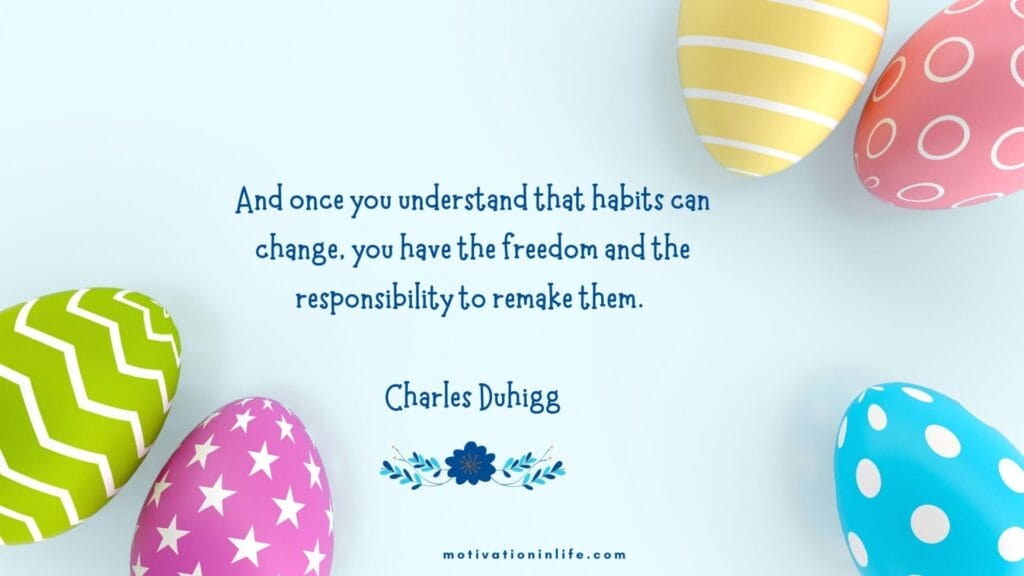
A Good Routine Builds New Habits Upon Existing Ones
This is also known as habit stacking, which was made popular by James Clear in his bestselling book, Atomic Habits. Habit stacking is where you add a new habit to a current one you already have. It should make sense that one habit follows another.
If one of your habits at night is to make your lunch for the following day so that it is ready to grab and go when you have to work, what else could you prepare for the next day at that time?
Maybe you want to lay out your workout clothes so you remember to do a morning workout when you wake up. These are both related to preparing for the next day, so it makes sense to “stack” them.
Any time you are adding a new habit to your routine, it helps to stack it with other habits at the same time. It is another reason why your routine is vital to adding new habits to your life or changing habits that you want to get rid of.
It Helps You Stay Accountable For Your Habit-Building Goals
Finally, you can stay more accountable when your small daily habits are part of your daily routine.
It can be really hard to remember and stay accountable for reading every day when it doesn’t fit into your routine. When are you going to read? In what room will you do the reading? When do you have the time and privacy to read?
If it doesn’t fit anywhere in your current daily routines, you’re not going to do it. This makes it almost impossible to stay accountable and actually do it every day.
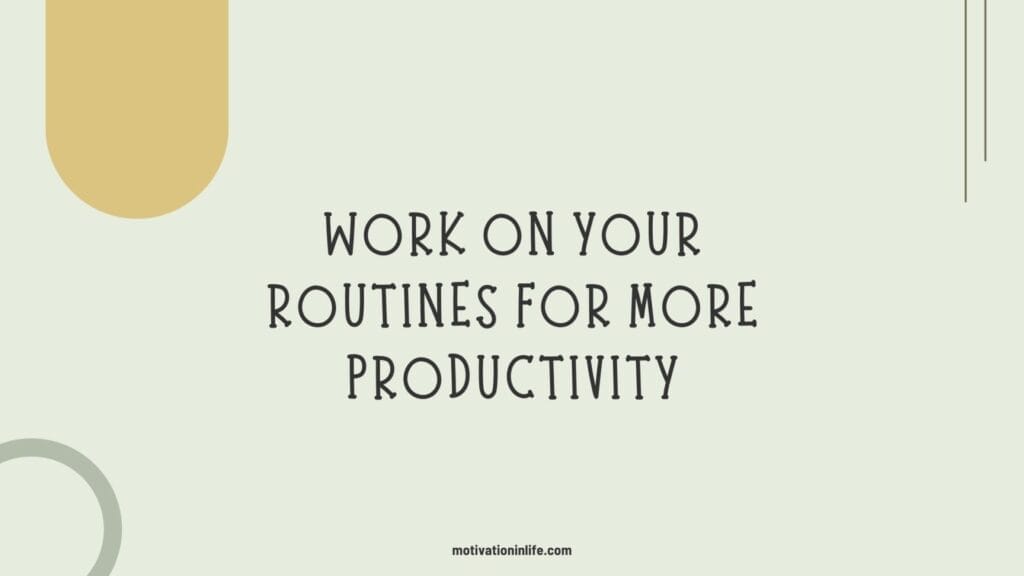
What Your Daily Routines Might Be Missing
You have been focusing on improving your morning and nighttime routines, adding in healthy habits, and removing toxic ones, but you still don’t feel any different and are not able to change your daily habits that will change your life. Why is that?
The problem might not be in the habits you choose to add to your daily routines, but in what is still missing from them. You need to identify those missing parts for changing life habits, especially as you age.
Here are some common things that daily routines are often missing, and can make a drastic difference in how much you benefit from them
Flexibility
Believe it or not, your daily routines might not be failing because you don’t have the right habits, but because you either have too many or they are too strict.
What you need for a healthy lifestyle is flexibility. This allows you to create daily routines with small good habits that help you work toward your goals but with the flexibility of adjusting to changes in your schedule.
If you are sick one morning and can’t do yoga or relax enough for meditation, your entire day isn’t ruined. You haven’t failed yourself, and there is nothing wrong with taking a rest.
We get so caught up in these daily routines that we feel like if we don’t do them perfectly every single day, we are no longer “that girl” and the entire day is a wash.
Have some flexibility in your routines. Select habits that help you on that day or work toward whatever goals you have. No two days will be identical, so you need to have more flexibility in your routines.

Purpose
A good daily routine also has a purpose. Don’t just choose habits for your routine that are similar to another routine you saw on Instagram or Pinterest.
If waking up at 4:00 am every day doesn’t work for you and causes more stress than if you wake up at 5 or 6, then you can skip this part of your routine.
Every aspect of your routine, from the time of day to the life changing habits that are included, should have a specific purpose.
Maybe you are someone who doesn’t benefit much from journaling, so instead of writing in your journal in the morning, you choose to use that time to set intentions in your daily planner. If this activity is more aligned with your goals, then it has a better purpose and better fits into your daily routine.
Look at each habit you have added to your routine and write down the reason you are doing it. For those habits that don’t have a purpose, cross them off, skip them, or replace them with something else. Only by following your heart will you be able to decide which habits to keep and which habits you need to change.
If, in all this, you feel you lack motivation, read our blog post on 15 Proven Tactics Of How To Get Motivation Back In Life (For The 40+) and take action!!
Accountability
You might have the perfect daily routine for you, but what you may be missing is some accountability. If you are good at choosing habits to do every day, creating a routine that works for your schedule, and making sure it has a specific purpose, but still don’t keep up with it for very long, you probably need more accountability.
This doesn’t have to be public accountability if you prefer to keep it to yourself. You can just have a daily checklist or habit tracker where you check off the habits you do each day and whether or not you complete that daily routine.
Again, this checklist can be used as a menu of options, not a strict to-do list where you must complete every task, every single day.
It might also help to get accountability and support from others if you don’t mind sharing your routines and habits. This can be posting it on social media, talking to friends who are trying to do something similar, or having a blog where you talk about your experience.
It is for this reason that I love the accountability I get in my blogging group, PIPS by Sadie Smilie, where we share our wins and struggles with our fellow bloggers.
You can try apps like Focusmate, which also works on similar principles and allows you to connect with people online, and they then become your accountability buddy with whom you can either co-work or share your mind.
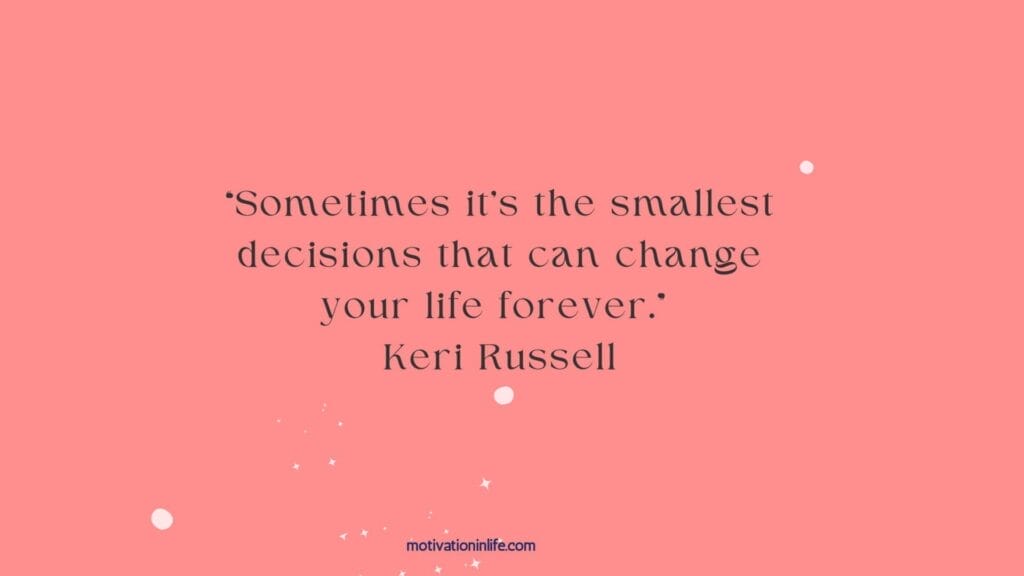
Balance
Building habits and creating sustainable daily routines are about balance. Don’t try to do too much, too quickly. You will be much more successful if you add new habits to your routine one at a time, as opposed to completely transforming a morning routine with 7 new habits all at once. It is so much for you to remember, and you won’t be fully focused on any one thing.
Everything in your life should have balance, flexibility, and purpose. You want to make choices that have a positive impact on your physical and mental health, increase your productivity, and make you happy.
If you lack balance in your routines, you will probably just feel frustrated, overwhelmed, and very unhappy with your life.
Adjustments
You are the one who is in control of your life, and you get to call the shots. This means if a daily routine isn’t working and you are not able to change your habits, you can fix it!
You are not destined to do the same thing forever, just because it was working for you when you first chose those habits.
Be honest with yourself about what habits are improving your life and what habits you aren’t seeing many benefits from. This differs for everyone, so it’s okay if a certain habit just isn’t your thing, even though your sister, co-worker, or best friend absolutely loves it.
In all this time management becomes an important aspect. Read our blog post, Answer Questions On Productivity To Manage Time Better (For The 40+), and get an insight into those aspects of your productivity you need to take care of.
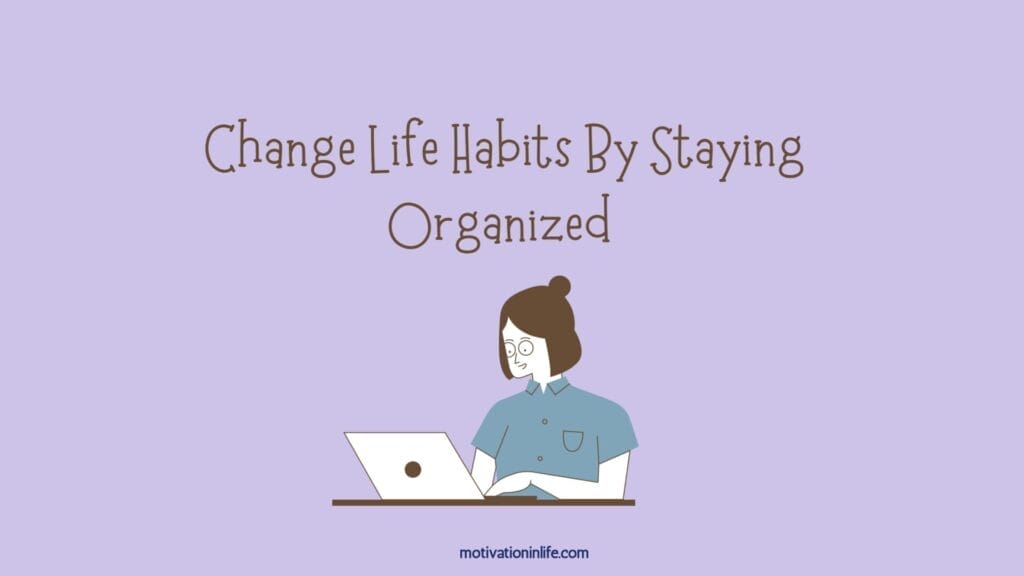
Why Staying Organized Is Essential To Your Routine For Changing Life Habits
Organization is one of those topics that people either love or hate.
Yet if, until the point you hit your 40s and beyond, you have been someone who chooses not to focus on organizing the spaces in your home and work environment, you might be unintentionally hurting your productivity and overall health in the long run.
Here are some reasons why staying organized is essential to your daily routines and for changing life habits that you want to get rid of.
You Get Motivation From Your Environment
Your environment includes any space outside of your physical body, such as where you live or work.
It can include your office, inside your home, your backyard, and your car. The environment where you spend your time has a much larger impact on your lifestyle and your routine than you might think.
You often pick up cues from your environment, which then influences the choices you make. If you are working on a morning routine where you write in your dream journal upon waking, then setting out your journal on your nightstand with a pen is going to give you the inspiration to write in it when you wake up. But if it is hidden away in a drawer, you won’t even remember to use it most mornings.
Your environment should accommodate and support your goals when it comes to your routine, and that includes being more organized. If you have a messy home or office, you are going to feel messy in your head.
If you are struggling with staying focused when you are working in your home office, then look around and figure out what might be messy or disorganized in your work environment.
It might be stacks of mail or paperwork you need to go through, a lot of clutter on your desk and shelves, or even the way the room is set up. This all matters and may be getting in the way of getting rid of all those habits you want to change.
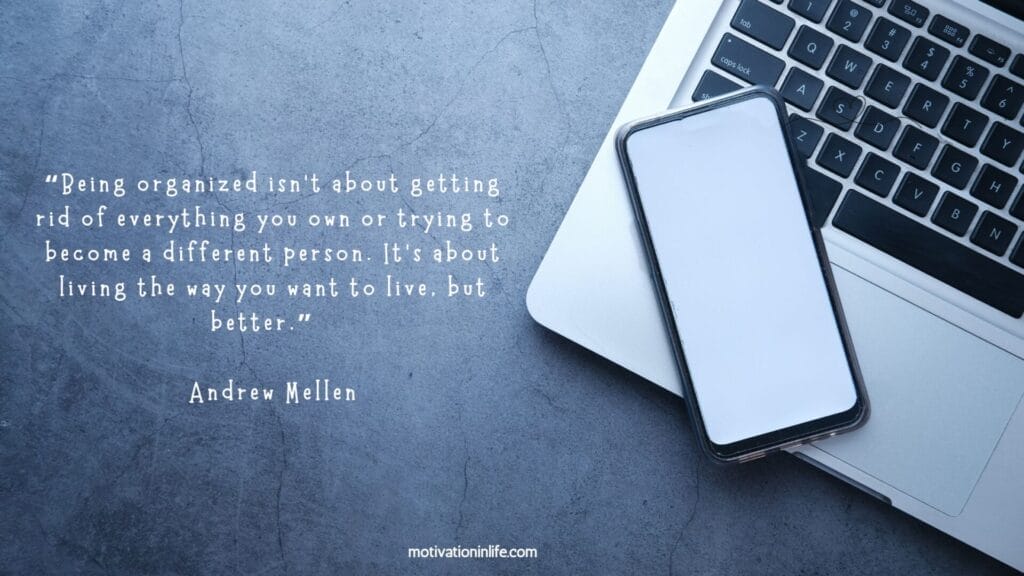
Staying Organized Makes Your Habits Easy And Convenient
Organizing the different spaces in your home makes it as easy and convenient as possible to add new habits and create a routine that works for you.
As you start to consider habits you want to add to your routine, think about ways you can adjust your environment to accommodate them.
For example, if you want to start a new habit of doing yoga in the morning, you need to have your workout mat organized and easy to find in the morning.
Even if you don’t lay it out the night before, you at least should have your clothes, shoes, and anything else you need to get started for doing yoga, where it is easy to find.
Do you know what happens when you can’t find something you need for your habits? You skip them. This can soon become a pattern, shortly before you give up entirely because it feels too hard. When all you needed was some planning and organization.
If you want some quick and easy tips to declutter your home or office space, you can read this awesome blog post by my fellow blogger, Marj Bates, 39 Pro Tips For All Your Decluttering Difficulties.
An Organized Space Helps To Increase Your Productivity
The less distracted you are when you are trying to get work done, the more productive you will be. Messy, chaotic, and disorganized spaces are very distracting.
Even if you keep the alerts on your phone turned off and don’t watch Netflix while you are working, you can still get distracted in your environment.
The more organized your space is, the more you will just focus on your work. Your mind isn’t constantly looking at your messy desk or thinking about what you need to clean in your home.
This also includes other areas of organization, like the digital files on your computer, the apps on your phone, and even the habits or routines you have each day.
Organization isn’t just putting things in bins and boxes to keep them from being cluttered, but having a system where everything makes sense.
if you feel that need a system that will help you track your life and keep it organized, I highly recommend you take the second brain challenge by my fellow blogger, Lindsay Kelly.
Using Google Sheets she very effectively teaches you how to have all the details of your life in one place. It is a game-changer for anyone looking to stay organized and productive.
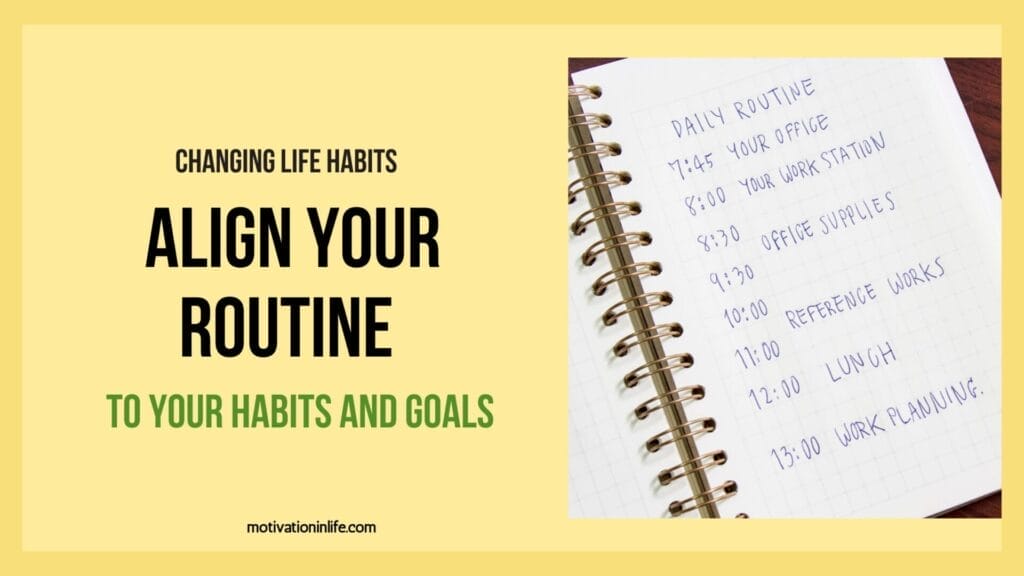
It Reduces Stress And Anxiety
A big reason to be more organized if you are trying to adapt to a healthy lifestyle with new daily routines is to reduce stress and anxiety.
When you live in a chaotic space that is filled with clutter and you can never find what you need, it doesn’t just affect your productivity or focus, it can also hurt your mental health.
Even though you may already be anxious, it will only get worse if you are constantly worried about not being able to find something or if there are messes all around you.
Something as simple as not being able to find the book you were reading that is part of your nighttime routine can create a feeling of stress. Suddenly, you get overwhelmed with frustration, and you just give up on the good daily habits that you have inculcated altogether. This happens a lot and can be resolved just by focusing more on being organized.
Toxic Habits To Remove From Your Routine In Your 40s And Beyond
When you are looking at good habits to add to your routine to improve your life, it is also a good idea to look at the bad ones. It goes without saying that by the time you reach your 40s, there are many habits that you will want to get rid of.
Toxic habits are not usually “bad,” but simply unhealthy or detract from your productivity.
Here are some toxic habits that may have become a part of your routine and daily life, and it might be a good idea to remove them from your routine, or at least minimize them when you can.
Constantly Using Your Phone
Remember your childhood, when you would spend time every evening either playing with your friends or having a good time with your family members?
In today’s digital age, excessive screen time has become a prevalent bad habit that has taken us over.
Spending long hours glued to screens, whether it’s on your smartphones, tablets, or computers, can negatively impact your physical and mental health. It can lead to poor posture, eye strain, sleep disruption, and decreased social interactions.
Not to mention it leads to other bad habits, like doom scrolling social media and taking in far too much information at one time. It is a good idea to set limits for yourself when it comes to screen time.
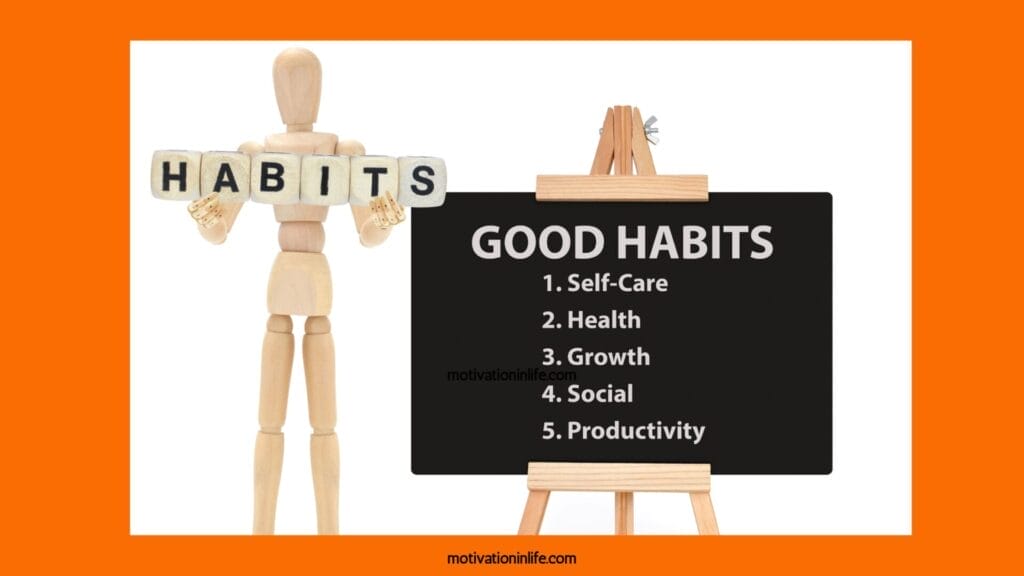
Letting Procrastination Take Over Your Life
Procrastination is something everyone does, and occasionally it’s not an issue. But when you get into the habit of constantly putting things off, that is when it becomes a problem.
Putting off tasks or delaying important responsibilities can result in missed deadlines, an increased workload, and unnecessary stress.
To overcome procrastination, practice time management techniques, break tasks into smaller, manageable chunks, set deadlines for yourself, and eliminate distractions.
If you find yourself procrastinating and are not aware of the root cause, please read our blog post, Understanding The 10 Reasons For Procrastination (For The 40+)
Relying On Takeout
Takeout is a convenient way to feed yourself, and can often include healthier options that save you time and money.
But like any other habit, when you rely on it too much, it becomes an issue. Even if you only eat the healthier options when you order food or bring it home, you get into the habit of never wanting to cook at home.
Try to set days of the week when you allow yourself to indulge, and days when you eat at home with food you prepared yourself.
Watching Screens Before Bed
Not only is it good to reduce screen time throughout the day, but before bed as well. It is very tempting to leave Netflix or YouTube on at night before sleep or to scroll your phone until you fall asleep, but this is often the reason you get poor sleep or have a lot of distractions in the middle of the night.
Try to shut off your screens before you head to bed.
Importance Of Routines In Changing Life Habits: Key Takeaways
Understanding the significance of routines in altering life habits is important, especially as you age, as it provides you with the necessary structure to progress in life.
By cultivating intentional daily practices and incorporating them into your routine mindfully, you pave the way for sustainable transformations in your habits and overall lifestyle.
Remember that the key lies not only in what you do but also in how consistently you integrate these actions into your daily rhythm. Trust in the potency of your routines to support your journey towards a healthier, more fulfilling life beyond 40.
Recommended Books To Start A Routine And Establish Life-Changing Habits
- Make Your Bed: Little Things That Can Change Your Life…And Maybe the World by Admiral William H. McRaven (Amazon.com | Amazon.in)
- Essentialism: The Disciplined Pursuit of Less by Greg McKeown (Amazon.com | Amazon.in)
IF YOU ENJOYED READING THIS POST, PLEASE PIN ONE OF THESE IMAGES BELOW!
I will be grateful for your kind gesture. Thank you!
